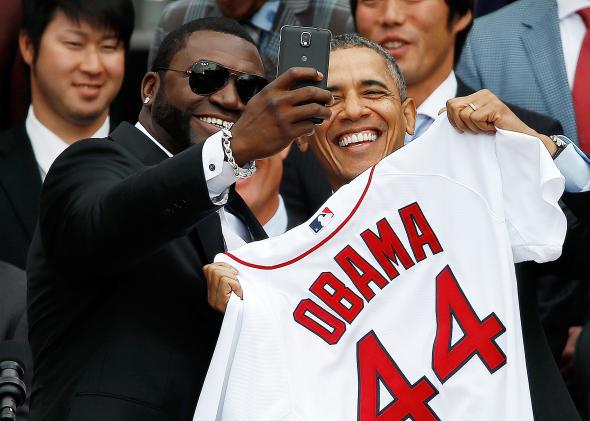Last week, Red Sox designated hitter David Ortiz took a selfie with Barack Obama while visiting the White House. You can’t blame a person for taking a presidential selfie—that opportunity just doesn’t come around that often. But as happens with so many Internet trends that try to interface with the real world, the selfie ended up causing some drama.
As the photo started circulating, Samsung retweeted it and noted that it was taken with a Galaxy Note 3. And then the company took credit for the whole thing. Plus Sports Business Daily reported that Ortiz had recently become Samsung’s “MLB social media insider.” Samsung told the Boston Globe,
We were thrilled to see the special, historic moment David Ortiz captured with his Galaxy Note 3 during his White House visit. It was an honor to help him capture such an incredible and genuine moment of joy and excitement. Similar to the selfie Ellen was able to capture during the Oscars, this was an opportunity for David to share the incredible moment with his fans. … When we heard about the visit to the White House, we worked with David and the team on how to share images with fans. We didn’t know if or what he would be able to capture using his Note 3 device.
But Ortiz and his PR team deny that the photo was taken for Samsung, or that he was prepped beforehand. Which is weird because Samsung clearly said that he was. Ortiz told the Globe, “That was one of those things that just happened. I gave him the jersey, and the photographers were going to take their pictures and I thought, really at the last second, maybe I should snap a shot with my phone while I have the chance. … It had nothing to do with no deals.”
Meanwhile the White House was upset. Perhaps they were already angry because Ellen DeGeneres’ Samsung-sponsored Oscar selfie stole the “most retweets ever” distinction from Obama. On The Ellen DeGeneres Show Obama joked that he “thought it was a pretty cheap stunt.” Samsung allegedly paid $20 million for promotion at the Oscars, and the company donated more than $3 million to charity because of the viral selfie.
But the White House had other reasons for being angry, too. Press secretary Jay Carney said in a briefing a couple of days after the Obama-Ortiz selfie, “As a rule, the White House objects to attempts to use the president’s likeness for commercial purposes, and we certainly object in this case.” And a few days after that, senior adviser Dan Pfeiffer said on Face the Nation, “Well, [President Obama] obviously didn’t know anything about Samsung’s connection to this, and perhaps maybe this will be the end of all selfies.” Some Olympic athletes who visited the White House after these comments even reported that they weren’t allowed to take pictures with the President using their own cell phones.
Yet somehow it doesn’t stop there. On Monday, almost a week after the controversy started, Carney said “there’s no discussion of a ban” on selfies for Obama, and that Pfeiffer “was saying [that] humorously.”
Whatever the status of an official moratorium, though, the real issue with all of this is that it’s boring. It’s a technicality. Selfies have gone from an Internet art form—perhaps loathsome but still genuine—to a policy issue. And this is what happens whenever advertisers get their hands on Internet memes. A commercial that attempts to tap an Internet trend may be the thing that makes the meme uncool, or it may just be the harbinger of a trend that has already peaked, but either way it’s never a good sign.
It might be Jimmy Kimmel creating his own version of a viral twerking video to point out how absurd the trend is (was?) and promote his show.
It might be Pepsi Max doing a rendition of the Harlem Shake for the Super Bowl.
It might be Abercrombie & Fitch inexplicably using “What Does the Fox Say?” in a commercial, even though the song seems to go against the company’s branding in almost every way.
Or it might be a completely unhinged version of “Honey Badger Don’t Give a Shit” that somehow tries to promote frozen yogurt for Red Mango.
Not all memes will resonate with you. Some will seem hilarious, while others just feel pointless and lame. So be glad if you see a commercial that invokes a meme you hate, because at that moment you’ll know the trend is losing its cool.
